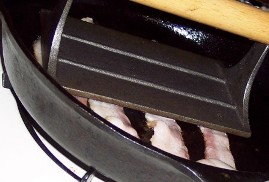Writing. Had a breakthrough on the plot in my novel-in-progress so I’ve been doing that in my spare time lately instead of blogging.
I promise this will wear off soon tho! Although hopefully not until the entire first draft is in the can.
:-)

Writing. Had a breakthrough on the plot in my novel-in-progress so I’ve been doing that in my spare time lately instead of blogging.
I promise this will wear off soon tho! Although hopefully not until the entire first draft is in the can.
:-)
Here’s a link to the May 1 entry of an online, hyperlinked copy of Chambers’ Book of Days, published 1869.
The book’s subtitle: A Miscellany of Popular Antiquities in Connection with the Calendar, Including Anecdote, Biography, & History, Curiosities of Literature and Oddities of Human Life and Character.
What more could you ask for, really?
I’m fascinated by the idea of transformation: the idea that a person might be born one thing, and then through intention, will, perhaps practice, become something else.
If it happens at all, true transformation is exceedingly rare, although to appreciate how rare you need to look past appearances. Consider the picture painted by this review of a biography of Ava Gardner (“Ava Gardner: ‘Love is Nothing’,” by Lee Server), online at the Literary Review. Reviewer Frank McLynn writes that Gardner
exemplified the classic rags-to-riches fable. The seventh child of a North Carolina sharecropping tobacco farmer, she was what the unkind describe as poor white trailer trash, with accent and ambitions to match. The height of her aspirations was to be a secretary in New York, but she was ‘discovered’ from a chance snapshot in a photographer’s window and whisked away to Hollywood for the big star build-up, purely on the basis of her looks.
Her physical circumstances were radically altered. Yet if you read on in the article, you learn that Gardner lived the sort of chaotic, alcohol-sodden life that you can glimpse by flicking on an episode of Cops. The changes to her life were purely superficial.
A contemporary with a somewhat similar experience is Archie Leach — aka Cary Grant. Like Gardner, Grant was born into near-poverty, went to Hollywood, and assumed a life of wealth and glamour. As part of his apparent transformation, Grant changed his name as well as his accent. But was he really transformed? I don’t know. But he seems to have had doubts himself; he’s quoted as saying, “I have spent the greater part of my life fluctuating between Archie Leach and Cary Grant, unsure of each, suspecting each.”
McLynn concludes his piece on Gardner:
As she herself often admitted, she was at root a simple country girl, with a country girl’s values and attitudes, pitchforked into a world of unreality simply because of her beauty. She grabbed whatever she could lay her hands on, and after all who could blame her?
I can’t blame anyone for grabbing what is handed them. But I also can’t give up the idea that there should be more — that as self-aware beings we should be doing more than reacting to what happens to us.
Assuming, of course, that the alternative is even possible.
It’s good for kids. Although they may not realize it.
The article (in the Guardian) is less science, more droll social commentary. A nice interlude if you haven’t anything else to to, ha ha ha.
Found this morning via Instapundit: a blog about neuroscience and metacognition written for lay people. I’ve just added it to my blogroll after reading a post there about a political blogger’s decision to close comments.
The article argues, based on research on mirror neurons (which I’ve blogged about here) and other phenomenon that avoiding unhappy people, and surrounding yourself with people who exhibit qualities you want to cultivate in yourself, is a highly rational and constructive thing to do.
One piece of advice you often find in self-help books on personal transformation is that sometimes you need to drop your old friends and find new ones. It turns out that bit of folk wisdom may actually have a basis in science . . .
Last month, I posted about a study that looked at people who think they’re lucky. The study found that self-described “lucky” people don’t actually beat the odds in an objective sense. But because they tend to be extroverted and open, they’re more likely to pick up cues and recognize opportunities, so they do have “luckier” lives.
Now comes a new twist, in a news story about a Powerball ticket worth $853,492 that has expired, unclaimed.
Somebody out there was lucky. But they missed an opportunity, and that made all the difference.
(There’s another unclaimed ticket for the same amount, purchased in Colorado, that expires at midnight tonight . . . )
It’s the first one I’ve had this season, which is quite an accomplishment considering that I live with a seven-year-old who counts among her primary functions congregating with 20-odd other seven-year-olds and mopping up a wide variety of microbes to carry back home.
There, how’s that for a sentence. Penetrating through my brain fog.
Anyway. I don’t really feel like blogging much, and haven’t since this came on. Give me a day or two, though, and I’ll be back ;-)
I’ve been trying to capture audio files to my harddrive through a microphone, using the mic jack in my PC, but I’m picking up tons of static.
Is that an issue with the quality of the mic?
It’s a Radio Shack headset/microphone. I can’t remember what it cost. Under $30.
If I invest in a higher quality mic, would that solve the problem?
I’m using the sound recorder utility that comes with Windows 2000. Are there better sound capture applications that would let me filter the static?
Anybody reading this able to help? Thanks!
My present to myself:

Three stalks of lucky bamboo for the yellow pitcher vase in my living room.
(Only $10 at Gardenscape at the Dome Arena! I remember a few years ago, you had to pay $20 just to look at a 3-inch piece of lucky bamboo from across the room . . .)
A bacon press.

Reasons:
1. Straight, flat bacon: it’s not just for obsessive compulsives any more.
2. Flat bacon is crispy bacon, and a clear majority prefer crispy bacon.
3. Martha Stewart might drop by. Think how impressed she’d be to discover you tracing the cuts for a set of corner bookshelves using your homemade quill pen and a piece of bacon.
4. Kevin Bacon might drop by, and since you’ve probably slept with him, you might as well feed him breakfast. And I’m sure he’d appreciate straight bacon. He’d probably phone the tabloids himself.*
5. You’re probably less likely to see Jesus’ face in a flat piece of bacon than in a wavy piece of bacon.
6. And while, in theory, we don’t object to seeing Jesus at breakfast, we’d prefer he appear in a pancake.
7. Although we hope his face doesn’t resemble Captain Pugwash’s.
8. We also hope his appearance wasn’t faked, because that upsets ebay.
9. You’re also less likely to see Satan’s face in a flat piece of bacon.
10. Especially since Satan prefers peppers. No surprise there, eh?